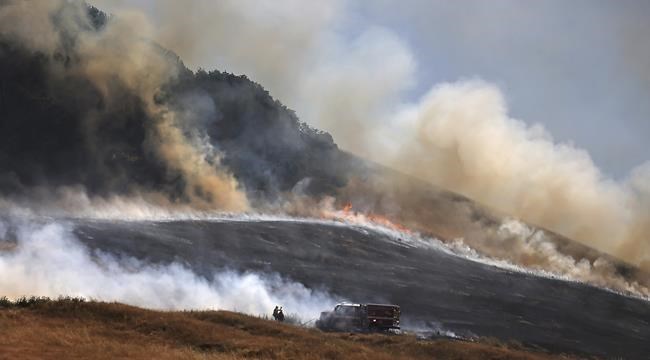Sweltering heat is blanketing the planet, and the past seven days have been the hottest week on record, the latest grim milestone in a series of climate-change-driven extremes.
Earth’s average temperature on Wednesday remained at an unofficial record high set the day before. And for the seven-day period ending Wednesday, the daily average temperature was .08 degrees Fahrenheit (.04 degrees Celsius) higher than any week in 44 years of record-keeping, according to data from the University of Maine’s Climate Reanalyzer, a tool that uses satellite data and computer simulations to measure the world’s condition.
The average global temperature for Tuesday and Wednesday was 62.9 degrees Fahrenheit (17.18 degrees Celsius). That follows a short-lived record set Monday, at 62.6 degrees Fahrenheit (17.01 Celsius). The Climate Reanalyzer figures are unofficial but significant data, and an indication that climate change is reaching uncharted territory.
“It’s certainly an alarming sign of the times,” said U.N. spokesman Farhan Haq, noting that the warming trend is a predicted consequence of nations not working fast enough to address climate change. “We might be facing greater climate catastrophes if we do not take action.”
More frequent and more intense heat waves are disrupting life around the world and causing life-threatening temperatures.
In Timbuktu, Mali — at the gateway to the desert — 50-year-old Fatoumata Arby said this kind of heat is new. “Usually, at night it’s a bit cool even during the hot season, but this year, even at night, it’s been hot - I’ve never seen anything like it,” said Arby, who rarely leaves her hometown. “I’ve been having heart palpitations because of the heat. I’m starting to think seriously that I’m going to leave Timbuktu.”
Last week, Egypt experienced one of its many summer heatwaves, with temperatures soaring above 100 degrees Fahrenheit (37.7 degrees Celsius), according to Egypt’s national weather forecaster. To combat heat and humidity, children on Thursday frolicked in the Nile River while pedestrians hunted the shade.
One of the largest contributors to this week's records is an exceptionally mild winter in the Antarctic. Parts of the continent and nearby ocean were 18-36 degrees Fahrenheit (10-20 degrees Celsius) higher than averages from 1979 to 2000.
“Temperatures have been unusual over the ocean and especially around the Antarctic this week, because wind fronts over the Southern Ocean are strong pushing warm air deeper south,” said Raghu Murtugudde, professor of atmospheric, oceanic and earth system science at the University of Maryland and visiting faculty at the Indian Institute of Technology, Bombay.
Chari Vijayaraghavan, a polar explorer and educator who has visited the Arctic and Antarctic regularly for the past 10 years, said global warming is obvious at both poles and threatens the region's wildlife as well as driving ice melt that raises sea levels.
“Warming climates might lead to increasing risks of diseases such as the avian flu spreading in the Antarctic that will have devastating consequences for penguins and other fauna in the region," Vijayaraghavan said.
___
Associated Press reporters Edith M. Lederer in New York; Sibi Arasu in Bengaluru, India; Ahmed Hatem in Cairo, Egypt; and Baba Ahmed in Bamako, Mali, contributed to this report.
___
Associated Press climate and environmental coverage receives support from several private foundations. See more about AP’s climate initiative here. The AP is solely responsible for all content.
Seth Borenstein And Melina Walling, The Associated Press


